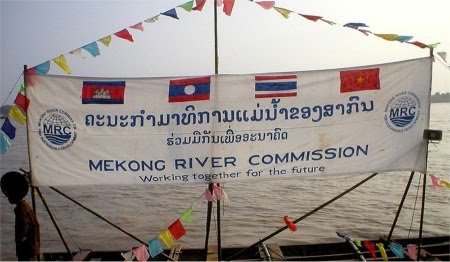 (Image source)
(Image source)
Don’t dream the Xayaburi hydropower project is over. It’s not dead yet, but Laos has a long fight ahead.
Environmentalists and the governments of Cambodia, Thailand and Vietnam are still savouring their victory at the Mekong River Commission Council meeting on Dec 8. They have reason to feel that way because the lower Mekong countries agreed to further assess the likely impacts of the dam project. This time they will ask Japan to undertake the study of the project …
[But] what is more important than “further study” is future diplomatic manoeuvring … Next will be the bargains and trade-offs which that are acceptable for Phnom Penh and Hanoi. Do not forget that Xayaburi is not the only dam that will be built in the Mekong’s lower basin. Cambodia, Laos, Thailand and Vietnam have 10 more dams altogether they want to build on the river.
Extracted from Saridet Marukatat, “Laos keeps its hydropower hopes alive”, Bangkok Post, 19 Dec 2011
Among many reports on the MRC Council meeting two weeks ago, this is one of the few to dig beneath the surface bonhomie of Mekong multilateralism. As the likes of Phil Hirsch and Milton Osborne have long emphasised, the MRC is not equipped to make decisions on the Mekong dams, mainstream or otherwise, and was never intended to be. Together with its technical and administrative role, it provides a mechanism for prior consultation on such dams, which Laos continues to argue it has fulfilled. Vietnam and Cambodia argue otherwise, and, as Saritdet identifies, it is the negotiations between these countries that ultimately seem set to decide the issue.
The key relationship would appear to be that between Laos and Vietnam, dearest of “fraternal socialist countries”. Given the frequent high-level exchanges between the two countries, it seems implausible that discussions of Xayaburi have not already taken place. From the perspective of Lao politics and history, the continued public opposition of these two countries remains the most fascinating aspect of the Xayaburi controversy (and may explain why the latest MRC meeting apparently went unreported in Laos). On the one hand, the Lao government’s statements have steadfastly refused to even mention a “delay” and, according to some sources, the project developers will continue to work unless Laos tells it not to. On the other, it seems unthinkable that Lao leaders would threaten the country’s treasured relationship with Vietnam over this or any other single issue. What level of public disagreement can the relationship reasonably withstand?
Yet, while the relationship with Vietnam remains as important as ever in Laos, it now needs to be seen within a wider array of relations that includes regional cooperation frameworks like the Greater Mekong Subregion (GMS) (ASEAN seems less relevant here). Related to this, of course, is the role of China, which despite not being a member of the MRC is a key player in the GMS framework and, increasingly, bilaterally in Laos. One big question is whether Laos’s strengthening relationship with China, coupled with the demonstration and equity effect of China’s dam-building upstream, have emboldened it to act more assertively with Hanoi over the Xayaburi issue.
Also intriguing is the role of Japan. The MRC’s press release said the decision to carry out further study was made in discussions between the prime ministers of the four MRC countries at the 3rd Mekong-Japan Summit, held during the recent ASEAN Summit in Bali. This suggests that Japan’s role may have been more proactive than suggested in news reports and the MRC’s own minutes, which said Japan would be “approached” to carry out a study. Through the MRC and GMS, Japan like China is heavily invested in ongoing regional cooperation. As Saritdet suggests, its intervention may be more about buying time to keep negotiations going, and the hope of multilateralism alive, than to facilitate further study. The bigger picture here is regional markets and investment, both of which, it might be added, require power (electricity) as well as regional cooperation. With this in mind, Laos may be quietly pleased that Japan – which, as well as strongly supporting regionalism in its various guises, is hardly averse to big infrastructure projects – is heading the latest studies.
This is all necessarily speculative. More certainly, a string of national interests – including those of the wider region’s biggest powers, Japan and China – figure directly or indirectly in the future of the Mekong. Some of these translate into support for multilateral cooperation and governance, at least at some levels, but others seem inevitably to undermine it. I for one will be interested to see how the Laos-Vietnam relationship navigates the current impasse. Though as always with such things, we may never really know.
 Facebook
Facebook  Twitter
Twitter  Soundcloud
Soundcloud  Youtube
Youtube  Rss
Rss